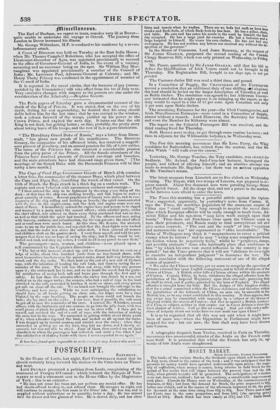The Times this morning has a powerful article against the
Opium War ; suggested, apparently, by yesterday's news from Canton. If,. says the Times, the maritime population of the enormous empire of China can " stand cutting" long enough to acquire the naval disci- pline which European officers will be ready enough to teach them, Ad- miral Elliot and his squadron " may have work enough upon their hands." Then there are Dutchmen close upon the Chinese coast to man their privateers, and Russia ready to lend surreptitious aid and give secret counsels. " The cost and the result" of' this "vexatious and unreasonable war" are represented as " alike incalculable." The Duke of Wellington may dilute it " magnanimous to cover a political enemy when he totters ;" and he may " wring some compliments from the friction whom he negatively feeds," whilst he " perplexes, damps, and possibly misleads " those who habitually place that confidence in hint " by which his own vast moral influence in the country is sup- ported ;' but the Times protests that it will not "abdicate its own right to exercise an independent judgment" to denounce the war. The article concludes with the following statement of one of the alleged causes of quarrel- " We enter the Chinese territory, yet we scorn to recognize the operation of Chinese criminal law upon English wrongdoers, and in behalf of subjects of the Crown of China. A British sailor kills a Chinese citizen within the precincts- of Canton. Captain Elliot, by force, withdraws the alleged offender tram the jurisdiction of the Imperial Magistracy upon their own soil ; proini,ing that he shall be tried, and it' guilty, punished by the laws of England. The alleged offender is brought home for trial. But the Judges of this kingdom declare, that the a crime committed within the Chinese dominions, and therefore within the jurisdiction of the tribunals of China, no man can be amenable to the British law, or to any court established in this country. It thus appears, that any crime may be committed with impunity by a subject of the Queen of England within the streets of Canton ; and that as against a British murderer of a Chinese subject, neither in that empire nor in Great Britain is there the least shadow of redress. Call ye this no wrong ? And yet with such a mill- stone of iniquity about our necks have we now made war upon China!"
It is to he regretted that all this was not said when it might bare been of more use—when the Opposition in Parliament might have stopped the war : but ere now, the first shell may have been thrown into Canton.


























 Previous page
Previous page